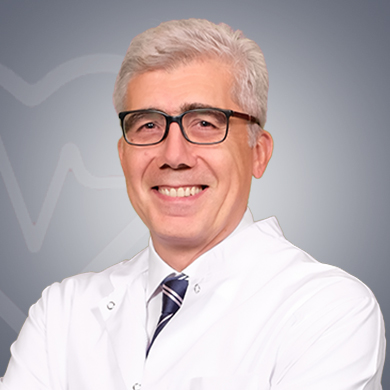
32 Years of experience
Speaks: English
Some of the conditions surgical oncologist Mete Gungor treats are:
Some women require surgery to remove the entire breast through mastectomy. The surgeons remove the breast tissues including nipple and the skin and the tissues that have the chest muscles. You may opt for breast reconstruction after a mastectomy.
There are around 200 different types of cancer and all these can cause different symptoms. The symptoms are often linked to some cancer types. The signs could also be general, including weight loss, fatigue, and unexplained pain. Cancer can produce various symptoms and these can differ from person to person. Some of the signs and symptoms of different types of cancer are as follows:
You can see Dr Mete Gungor between 11 am and 6 pm from Monday to Saturday. The doctor is not available on Sunday.
The below-listed popular procedures for cancer treatment are performed by Dr. Mete Gungor
The doctor has performed a large number of successful procedures for cancer treatment, with a high success rate has received worldwide recognition for their patient-centric approach and holistic approach. Patient safety is the top priority for the doctor who follows all medical protocols and provides care of international standards. A surgical oncologist performs cancer surgery in two ways: minimally invasive surgery and open surgery. Minimally invasive surgery uses techniques that focus on minimizing the trauma of traditional surgery. Some of the minimally invasive techniques are cryosurgery, robotic surgery, laparoscopy, cryosurgery, and laser surgery. In open surgery, surgeons make a single large cut to remove the tumor and some healthy tissues.

Share Your Experience about Dr. Mete Gungor

The surgical oncologist is often the first among cancer specialists to see cancer patients. The primary doctor most commonly does a diagnosis, and in cases where this requires biopsy or surgery, the surgical oncologist is called. Surgical oncologists are doctors with experience in cancer surgery. A surgical oncologist performs surgeries to know which parts of the body cancer has spread. In order to diagnose cancer, a surgical oncologist might perform biopsies. After a biopsy, a surgical oncologist sends the samples to a pathologist. If cancer is detected, you may need to consult the surgical oncologist again to have the tumor removed. The surgical oncologist performs a staging surgery to determine a tumor’s size.
The tests required before and during the consultation by a surgical oncologist include:
In most cases, surgical oncologists need to perform a biopsy in order to diagnose cancer. In this procedure, the doctor removes a part of the body tissues to examine under a microscope. The doctor then does other tests to check if the tissue is cancer.
You should see a surgical oncologist in case your primary care doctor refers you to one. The doctor may also tell you to visit a surgical oncologist for the diagnosis of cancer. Some specialized general surgeons can also perform surgery on various types of cancer. In the below-listed situations, you must seek assistance from a surgical oncologist: